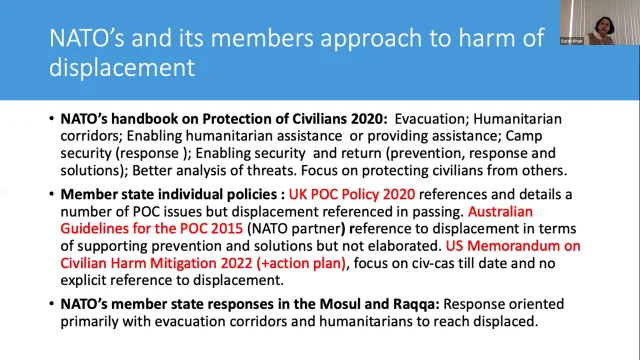March 2, 2022 - Displacement of Civilians and the Efficacy of IHL
From “Reverberating Effects” of Warfare to the Interface of Conflict and Climate Change Migration
A collaboration of the Canadian Red Cross and York University’s Glendon School of Public and International Affairs, Nathanson Centre on Transnational Human Rights, Crime and Security, and Osgoode Hall Law School
Does current International Humanitarian Law have a sufficiently robust approach to the protection of civilian populations from displacement? This mini-conference will explore this question from three vantage points.
The afternoon opens with an overview address on the general framework within which displacement issues are addressed by IHL, given by the Canadian Red Cross’ Senior Legal Advisor on IHL.
The first panel will then cast a critical eye on whether protections against displacement are adequately articulated in the generally accepted body of IHL norms or in the practice of important actors, like NATO and the ICRC. A key focal point will be the absence of explicit mention of displacement due to the threat or use of violence in NATO’s 2016 Policy for the Protection of Civilians – including with respect to whether this absence has affected on-the-ground engagements of NATO and NATO member states in places like Afghanistan, Syria, and Iraq. The seeming preference by a variety of practitioners and actors for situating arguments regarding displacement caused by warfare within a wider conceptual framework of “reverberating effects” will be discussed as one flipside of the NATO policy’s avoidance.
The second panel will look at the interaction of conflict and climate change as drivers of civilian displacement, most especially what is otherwise often termed climate migration. The panel aims to grapple with the efficacy of IHL for providing meaningful responses to this interaction and its consequences. The discussion will ask whether IHL can evolve properly in interaction with parallel fields of international law, such as climate change law and international human rights law as well as with the emergent field of international and transnational “disaster law.”
Featuring presentations from:
Sarah Khan
Former Senior Protection Officer of UNHCR; Research LLM candidate, Osgoode Hall Law School/ Graduate Scholar, Dahdaleh Institute for Global Health Research
Ndeye Dieynaba Ndiaye
Professor of migration law in the Department of Legal Sciences, UQAM | University of Quebec in Montreal
Saptarishi Bandopadhyay
Assistant Professor of Law, Osgoode Hall Law School, and author of ‘All is Well’
Rachel Laut
Author of ‘Humans on the Move: Integrating an Adaptive Approach with a Rights-Based Approach to Climate Change Mobility’
Sophie Rondeau
Senior Legal Advisor, IHL, Canadian Red Cross
Location: Online via Zoom
Date: Wednesday, March 2, 2022
Time: 1:30 pm - 4 pm
Register here: Closed
Agenda
(Note: The Canadian Red Cross is committed to social inclusion. To help us measure our progress, we try to gather information about participant demographics. This information is for internal purposes and will not be shared with other organizations. If you are not comfortable sharing this information, feel free to select “prefer not to answer”)

